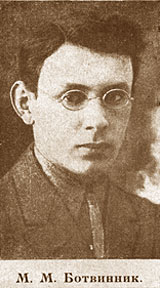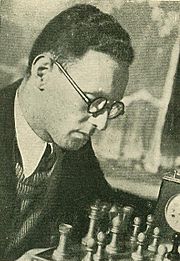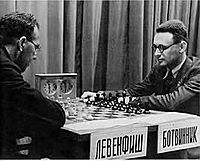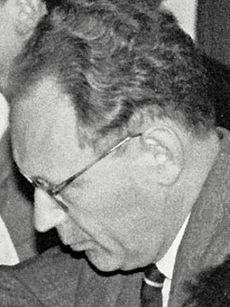Mikhail Botvinnik facts for kids
Quick facts for kids Mikhail Botvinnik |
|
|---|---|
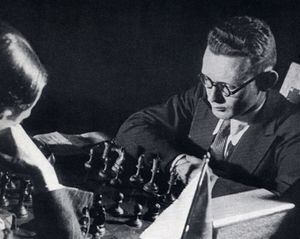
Botvinnik in play against Salo Flohr, match 1933
|
|
| Full name | Mikhail Botvinnik |
| Country | USSR |
| Born | August 17, 1911 Kuokkala, Russian Empire (now Repino, Russia) |
| Died | May 5, 1995 (aged 83) Moscow, Russia |
| Title | Grandmaster |
| World Champion | 1948–1957 1958–1960 1961–1963 |
Mikhail Botvinnik (born August 17, 1911 – died May 5, 1995) was a famous Soviet Russian chess player. He was a grandmaster and won the World Chess Championship three times.
Botvinnik was also an electrical engineer. He was one of the few chess masters who had a successful career outside of chess.
He was the first world-class chess player to come from the Soviet Union. This gave him a lot of power in Soviet chess. He helped create the rules for the World Chess Championship after World War II. After he stopped playing, he coached young players. Three of his students became future World Champions: Anatoly Karpov, Garry Kasparov, and Vladimir Kramnik.
Contents
Botvinnik's Early Life
Growing Up in Russia
Mikhail Moiseyevich Botvinnik was born near St. Petersburg. His family was Jewish. His father was a dental technician and a singer in the local synagogue. His mother was a dentist.
Because his mother was a dentist, his family could live outside the "Pale of Settlement." This was an area where most Jewish people in Russia had to live at that time. So, Mikhail grew up in a nice part of Saint Petersburg.
His father did not allow them to speak Yiddish at home. Mikhail and his older brother went to Soviet schools. Botvinnik later said, "I am a Jew by blood, Russian by culture, Soviet by upbringing."
Discovering Chess Talent
In 1925, a big chess tournament was held in Moscow. This was to see how good Soviet chess players were. During a break, the world champion, José Raúl Capablanca, played many games at once in Leningrad.
Botvinnik was chosen to play against him. Young Mikhail won his game against the world champion!
In 1928, Botvinnik started studying math at Leningrad University. The next year, he played for Leningrad in a student chess championship against Moscow. Leningrad won, and Botvinnik was able to switch to study electrical engineering.
He quickly became a very good player. In 1930, he won the Leningrad Masters' tournament. The next year, he won the Championship of Leningrad. He beat the former Soviet champion Peter Romanovsky by 2½ points.
Becoming a Soviet Chess Champion
In 1931, when he was 20, Botvinnik won his first Soviet Championship in Moscow. He scored 13½ out of 17 points. Later that year, he finished his degree in Electrical Engineering.
In 1933, he won the Soviet Championship again. This time it was in his hometown of Leningrad. He scored 14 out of 19 points.
Soon after, Botvinnik played a match against Salo Flohr. Flohr was a strong player. Botvinnik was losing by two games at first. But with help from his friend Viacheslav Ragozin and coach Abram Model, he tied the score. The match ended in a draw.
Playing Outside the USSR
Botvinnik played in his first tournament outside the USSR in 1934–35. It was the Hastings International Chess Congress. He only tied for 5th-6th place. He later learned that he should have arrived earlier to get used to the new place. He never made that mistake again.
In 1935, Botvinnik played in Moscow's second International Tournament. He tied for first place with Flohr. He was ahead of famous players like Emanuel Lasker and José Raúl Capablanca.
After this, people wanted to give Botvinnik the grandmaster title. But Botvinnik said titles were not important. However, he did accept a free car and more money for his studies.
In June 1936, an even stronger tournament was held in Moscow. Botvinnik finished second, just behind Capablanca.
Later in 1936, Botvinnik was invited to play in a tournament in Nottingham, England. He played very well and tied for first place with Capablanca. He was ahead of the World Champion Max Euwe and other top players. This was the first time a Soviet master won a tournament outside of their country. When the news reached Russia, Botvinnik was given a special award called the "Mark of Honour."
In 1937, Botvinnik played a match against Grigory Levenfish. The match ended in a draw after thirteen games.
Botvinnik won more Soviet Championship titles in 1939, 1944, 1945, and 1952. This brought his total to six titles. He shares this record with Mikhail Tal. In 1945, he won the tournament easily, scoring 15 out of 17 points.
Becoming World Champion
Botvinnik helped create the system for how the World Chess Championship would be played from 1948 to 1963.
Because he played so well during and after World War II, Botvinnik was one of five players chosen to play in the World Chess Championship in 1948. It was held in The Hague and Moscow. He won the tournament easily, becoming the sixth World Champion.
Botvinnik held the title for the next fifteen years. He played seven world championship matches during this time.
In 1951, he played a match against David Bronstein in Moscow. The match was a draw after 24 games, so Botvinnik kept his title.
In 1954, he drew another match against Vasily Smyslov in Moscow. He kept the title again.
In 1957, he lost to Smyslov. But the rules at the time allowed him to have a rematch without having to qualify again. In 1958, he won the rematch against Smyslov.
In 1960, Botvinnik lost to Mikhail Tal, who was only 23 years old. But again, Botvinnik used his right to a rematch in 1961. He won this rematch. Botvinnik played much better this time. He changed his playing style to avoid Tal's tricky moves. He focused on slower games and endgames, where Tal was not as strong.
Finally, in 1963, he lost his title to Tigran Petrosian. This time, the rules had changed, and he was not allowed a rematch. The rematch rule had been called the "Botvinnik rule" because he used it twice.
Later Life and Legacy
In 1970, Botvinnik stopped playing chess professionally. He then worked on computer programs that could play chess.
Even though his computer work didn't have big results, his coaching was very successful. He helped train many top young players. As mentioned, three of his students became World Champions.
Mikhail Botvinnik died in Moscow in 1995.
Images for kids
See also
 In Spanish: Mijaíl Botvínnik para niños
In Spanish: Mijaíl Botvínnik para niños
 | William L. Dawson |
 | W. E. B. Du Bois |
 | Harry Belafonte |


